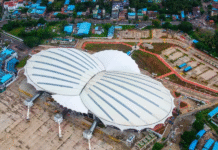For much of India, August 1, 2025, quietly marked the end of a ritual. The Indian Postal Department officially discontinued ordinary mail delivery after more than 50 years, leaving only Speed Post and premium services in operation. Across mainland cities and small towns, the familiar envelope marked “On Government Service” will no longer arrive in the morning postman’s bag.
But here in the Andaman & Nicobar Islands, post office still does things the old way. Against the tide of change, it continues to sort, stamp, and send ordinary letters, making it one of the last in the country to do so.
In most of India, workplace communication has been fully absorbed into the digital world. Letters have been replaced by pings, memos by emails, and waiting days for an important document is considered impractical. But in this island corner of the nation, the slow journey of a letter remains a daily fact of life.
For many here, ordinary mail is more than nostalgia. In an archipelago where internet connectivity can be inconsistent and logistics depend on weather and ferry schedules, the postal service has retained its relevance. A transfer order, pension update, or appointment letter still carries weight when it arrives in a physical envelope, tangible proof that someone, somewhere, took the time to write, sign, and send it.
Locals say there is a rhythm to these deliveries. Postmen, who often know every resident by name, walk their routes with the quiet authority of someone carrying news that matters. The letter might be a promotion, a formal notice, or even just a holiday greeting from a mainland relative. Whatever it contains, it arrives with a sense of ceremony rare in today’s always-on work culture.
Elsewhere in India, the end of ordinary mail has been justified in the name of efficiency. Speed Post ensures documents arrive in a day or two. Digital platforms make communication instantaneous. Yet, with speed has come a loss, the pause between sending and receiving, the space for thought, and the grace of formality in workplace exchanges.
Here, that pause still exists. A manager’s decision sent by letter takes days to reach its recipient. The delay can be frustrating, but it also allows time for reconsideration and reflection, luxuries in a digital world where reactions are expected instantly.
In the past, India Post was the backbone of HR, legal, and administrative processes. The postman was not just a courier but a bridge between institutions and individuals. In the Andamans, that bridge remains intact. Offices still file away official letters. Families still keep important envelopes in drawers. Some residents have stacks of old correspondence, yellowing with age but holding the history of careers and communities.
When asked, “the postmaster smiled and said the service still runs – even giving directions on how to send a letter, with humble warmth.” With geography, weather, and tradition on its side, this small post office has resisted the shift, not because it rejects progress, but because the pace of island life allows it.
The rest of the country may have moved on, but in this corner of the Bay of Bengal, the sound of a postman’s bicycle bell still signals more than mail, it signals continuity.
Perhaps that’s the real story: in a world rushing forward, a few places still hold on to the value of slowness. Here in the Andamans, the letter hasn’t yet been replaced by the notification. And while that lasts, so will the quiet dignity of the ordinary post.





